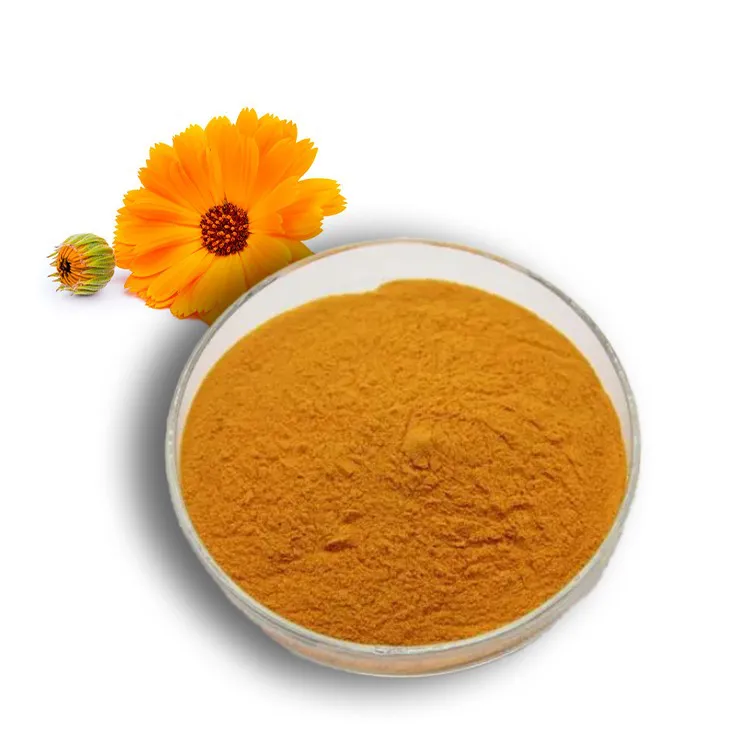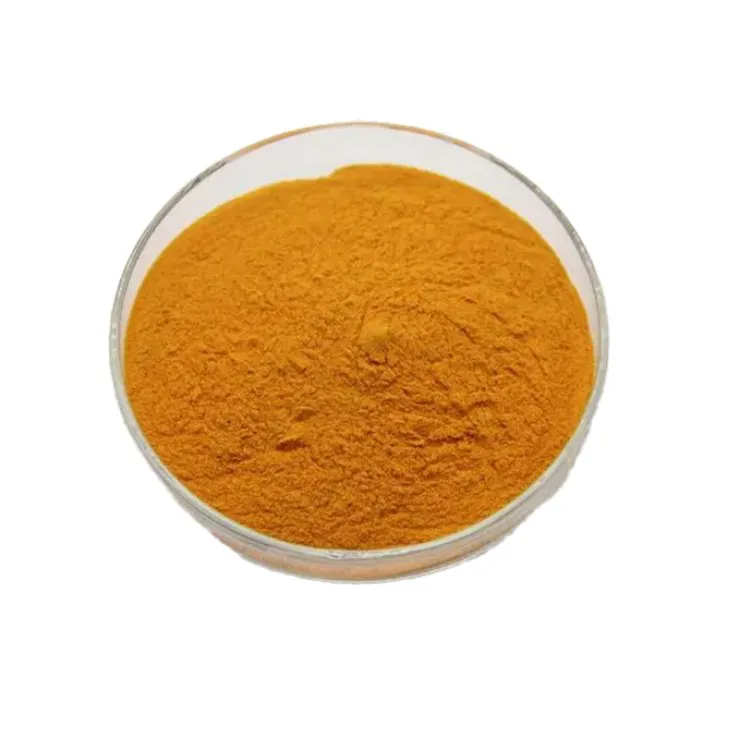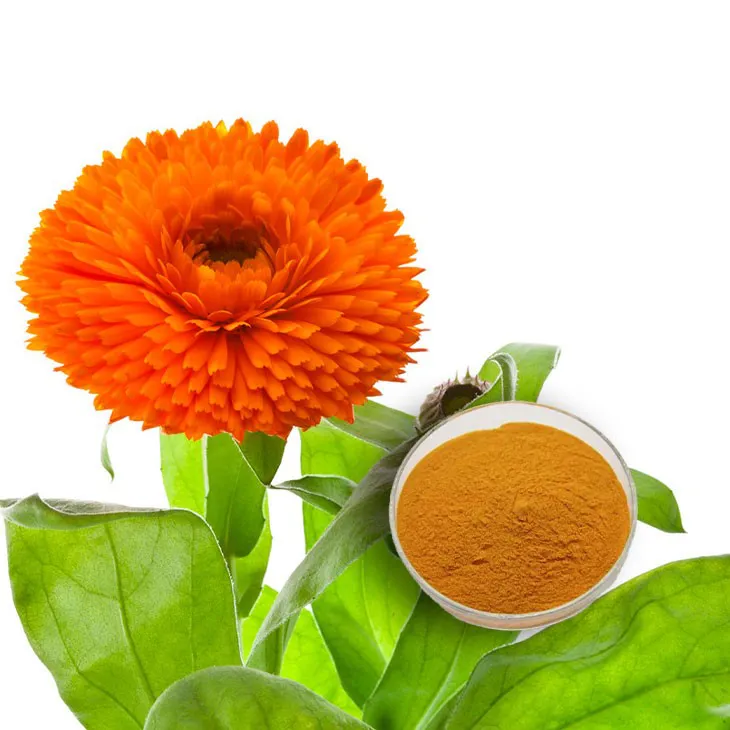- 0086-571-85302990
- sales@greenskybio.com
Five Efficacy of Calendula Extract + Dosage, Side Effects
2024-11-12

1. Introduction
Calendula, also known as pot marigold, has been used for centuries in traditional medicine. Calendula Extract, derived from the flower of this plant, is rich in various bioactive compounds. In this article, we will explore five main efficacies of Calendula Extract, discuss the appropriate dosage, and also mention possible side effects.

2. Efficacy of Calendula Extract
2.1 Anti - Inflammatory Properties
One of the significant efficacies of calendula extract is its anti - inflammatory effect. Calendula contains flavonoids, terpenoids, and carotenoids which contribute to its anti - inflammatory action. These compounds can inhibit the production of pro - inflammatory cytokines and mediators in the body. For example, in skin conditions such as eczema and dermatitis, calendula extract can reduce redness, swelling, and itching. It can be applied topically in the form of creams or ointments to soothe inflamed skin. In internal use, it may also help in reducing inflammation in the digestive tract or joints.
2.2 Wound Healing
Calendula extract has excellent wound - healing properties. It stimulates the production of collagen, which is essential for the repair of damaged tissues. The extract also has antimicrobial properties, which helps prevent wound infections. In minor cuts, abrasions, and burns, calendula - based products can accelerate the healing process. For instance, applying calendula tincture or ointment to a small cut can promote faster scabbing and tissue regeneration. It is often used in natural first - aid remedies due to its effectiveness in promoting wound closure and reducing the risk of scarring.
2.3 Antimicrobial Activity
Calendula extract exhibits antimicrobial activity against a variety of bacteria, fungi, and viruses. The bioactive compounds in calendula can disrupt the cell membranes of microorganisms, inhibiting their growth and replication. Studies have shown that it can be effective against common skin pathogens such as Staphylococcus aureus and Escherichia coli. This makes calendula extract useful in treating skin infections, such as acne, where bacteria play a role. It can also be used as a natural preservative in cosmetic and herbal products due to its antimicrobial properties.
2.4 Anti - Oxidant Effects
The presence of flavonoids and carotenoids in calendula extract endows it with strong anti - oxidant properties. Anti - oxidants are crucial for neutralizing free radicals in the body, which are unstable molecules that can cause oxidative stress and damage to cells. By scavenging free radicals, calendula extract helps protect cells from damage, which may contribute to various health benefits. For example, it may play a role in preventing premature aging, reducing the risk of chronic diseases such as heart disease and cancer, and maintaining healthy skin by preventing oxidative damage to skin cells.
2.5 Digestive Health
Calendula extract can also benefit digestive health. It has been used traditionally to relieve digestive problems such as indigestion, bloating, and gastritis. The anti - inflammatory properties of calendula may help soothe the lining of the digestive tract, reducing inflammation. It may also have a mild laxative effect, promoting regular bowel movements. Additionally, its antimicrobial properties can help combat harmful bacteria in the gut, maintaining a healthy gut microbiota balance.

3. Dosage of Calendula Extract
The appropriate dosage of calendula extract can vary depending on the form of the extract and the intended use.
3.1 Topical Use
For topical application in creams, ointments, or tinctures, a general guideline is to apply a thin layer to the affected area two to three times a day. However, it is important to follow the instructions on the product label, as different formulations may have specific recommended dosages. For example, some calendula - based creams may be designed for more frequent application for severe skin conditions, while others may be sufficient with once - daily application for milder issues.
3.2 Oral Use
When using calendula extract orally, such as in the form of capsules or teas, the dosage should be more carefully regulated.
- If using calendula capsules, a typical adult dosage may range from 300 - 900 mg per day, divided into two or three doses. However, it is advisable to consult a healthcare provider before starting any new supplement regimen, especially if you have underlying health conditions or are taking other medications.
- For calendula tea, one can brew about 1 - 2 teaspoons of dried calendula flowers in a cup of hot water and drink it two to three times a day. But again, individual tolerance and health status should be considered, and it is best to start with a lower dose and gradually increase if well - tolerated.

4. Side Effects of Calendula Extract
While calendula extract is generally considered safe for most people, there are some possible side effects to be aware of.
4.1 Allergic Reactions
Some individuals may be allergic to calendula. Allergic reactions can range from mild skin rashes, itching, and redness at the application site (in case of topical use) to more severe symptoms such as difficulty breathing and swelling of the face, lips, or tongue (in case of ingestion or more widespread allergic response). If you have a known allergy to plants in the Asteraceae family (which calendula belongs to), it is best to avoid using calendula extract. People with sensitive skin may also want to do a patch test before using calendula - based products topically.
4.2 Interaction with Medications
Calendula extract may interact with certain medications. For example, it may potentiate the effects of anticoagulant medications, increasing the risk of bleeding. It is crucial to inform your healthcare provider if you are taking calendula extract, especially if you are on any prescription medications. Additionally, calendula may interact with immunosuppressive drugs, potentially interfering with their efficacy. Therefore, it is important to exercise caution when using calendula extract in combination with other medications.

5. Conclusion
Calendula extract offers a range of benefits, including anti - inflammatory, wound - healing, antimicrobial, antioxidant, and digestive health - promoting properties. When used appropriately in terms of dosage and with awareness of possible side effects, it can be a valuable addition to natural remedies. However, as with any herbal product, it is always advisable to consult a healthcare professional before starting to use calendula extract, especially for those with underlying health conditions or those taking medications.
FAQ:
What are the five efficacy of calendula extract?
Calendula extract has anti - inflammatory properties, which can help reduce inflammation in the body. It also has antioxidant effects, protecting cells from oxidative damage. Another efficacy is its antimicrobial ability, which may combat certain bacteria and fungi. It can promote wound healing, soothing and speeding up the recovery process of skin injuries. Additionally, calendula extract may have anti - allergic properties, alleviating some allergic reactions.
How to determine the proper dosage of calendula extract?
The proper dosage of calendula extract can vary depending on several factors. For topical use in creams or ointments, it is typically used in concentrations ranging from 2% - 10%. However, when taken orally, it is advisable to follow the instructions on the product label or consult a healthcare provider. In general, a common oral dosage might be in the range of 300 - 500 mg per day, but this should be adjusted based on individual needs, age, and overall health status.
What are the possible side effects of calendula extract?
Although calendula extract is generally considered safe, some people may experience side effects. Topical use may cause skin irritation, redness, or allergic contact dermatitis in sensitive individuals. When taken orally, in rare cases, it may cause gastrointestinal discomfort such as nausea, vomiting, or diarrhea. Pregnant and breastfeeding women should be especially cautious and consult a doctor before using calendula extract.
Can calendula extract be used for all skin types?
Calendula extract is generally suitable for most skin types. However, those with extremely sensitive skin may need to do a patch test before using calendula - based products topically. For oily skin, it can help control sebum production and reduce inflammation. For dry skin, it can soothe and moisturize. Normal skin can also benefit from its antioxidant and anti - inflammatory properties.
Is calendula extract effective in treating acne?
Yes, calendula extract can be effective in treating acne. Its anti - inflammatory properties help reduce the redness and swelling associated with acne. It also has antimicrobial effects, which can combat the bacteria that contribute to acne formation. However, it may not be a standalone solution for severe acne cases and is often used in combination with other acne - treating ingredients or therapies.
Related literature
- The Therapeutic Potential of Calendula officinalis Extracts"
- "Calendula Extract: Chemical Composition, Pharmacological Properties, and Clinical Applications"
- "Beneficial Effects of Calendula in Skin Health: A Review"
- ▶ Hesperidin
- ▶ citrus bioflavonoids
- ▶ plant extract
- ▶ lycopene
- ▶ Diosmin
- ▶ Grape seed extract
- ▶ Sea buckthorn Juice Powder
- ▶ Beetroot powder
- ▶ Hops Extract
- ▶ Artichoke Extract
- ▶ Reishi mushroom extract
- ▶ Astaxanthin
- ▶ Green Tea Extract
- ▶ Curcumin Extract
- ▶ Horse Chestnut Extract
- ▶ Other Problems
- ▶ Boswellia Serrata Extract
- ▶ Resveratrol Extract
- ▶ Marigold Extract
- ▶ Grape Leaf Extract
- ▶ blog3
- ▶ Aminolevulinic acid
- ▶ Cranberry Extract
- ▶ Red Yeast Rice
- ▶ Red Wine Extract
-
Dandelion Root Extract
2024-11-12
-
Bitter Melon Extract
2024-11-12
-
Chasteberry Extract
2024-11-12
-
Andrographis Paniculata Extract Powder
2024-11-12
-
Hops Extract
2024-11-12
-
White Peony Extract
2024-11-12
-
Cocoa Extract
2024-11-12
-
Tamarind extract powder
2024-11-12
-
Resveratrol extract
2024-11-12
-
Longan Extract
2024-11-12





















